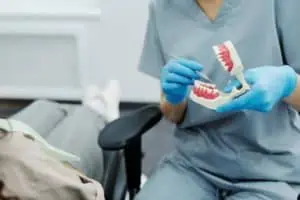
Visible Signs of Oral Cancer
Oral cancer can be tricky to detect because it can often look like other things that aren’t so serious. However, any one of these particular signs could be a cause for concern. If you see any of these common signs of oral cancer, you should call your dentist in Asheboro as soon as possible, especially if they don’t go away on their own after two or three weeks.
- Chronic cough
- Changes in voice
- Difficulty swallowing
- An earache on one side
- A hard lump in the soft tissues
- Swollen tonsil on one side without pain
- A painless lump on the outside of the neck
- Any sore that doesn’t heal itself within 2-weeks
- Discoloration in the mouth, including a red, white, or black appearance
Early Detection is Key
Yes, oral cancer can be deadly. However, it can often be treated very successfully. But the key to successful treatment is to catch it early. During your regular visits to your dentist in Asheboro, your dental team will look for any concerning areas and monitor any changes that may require more evaluation. You should also keep an eye on your oral health at home to monitor changes in your mouth. Check Your Mouth has some great resources that you can, and should, use to periodically check your mouth for problems.
Why Does Oral Cancer Occur?
The truth is that anyone can get oral cancer. But there are certain things that increase the risk. Some of them are controllable, others are not.
- Age: People over 50 years old are more likely to get oral cancer
- Tobacco Use: 80% of people who get oral cancer are those who use tobacco products
- Drinking Alcohol: Almost 70% of those diagnosed with oral cancer are heavy drinkers
- Gender: Men are two times more likely to develop oral cancer than women
Oral cancer is a serious condition that results in nearly 11,600 deaths in America every year. It can affect the tongue, tonsils, gums, and other parts of the mouth. For this reason, and many others, we recommend seeing your dentist in Asheboro every six months for regular exams.















